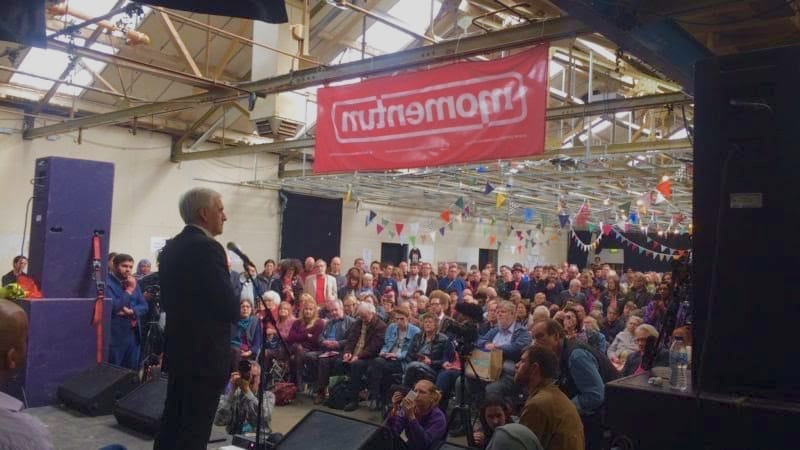

By Jeremy Dewar
Momentum has launched a “Democracy Consultation” by emailing a link – not to its membership – but to handpicked “engaged activists”. Momentum certainly needs a democracy review. However, this isn’t it.
The proposals are threadbare and, taken as a whole, even regressive. Whether the comments they receive will ever be made public is not mentioned.
The NCG is proposing to increase the number of representatives on the leading body from 12 to 20 by increasing the number of regions from three to five, giving elected reps a majority on the NCG for the first time. But what Momentum gives with one hand, it takes away with the other; elections will be reduced to only every two years.
The regions are still absurdly large, stretching from Land’s End to Margate and from John O’Groats to Hull, and they have no existence apart from for electoral purposes. Some Momentum groups (which were formally abolished by Lansman’s constitutional coup) organise joint meetings occasionally but that’s it. The suggestion that elected representatives need two years to get to know their “regional” activists is absurd. They have no connection to the grassroots.
Their website link claim they are merely putting Momentum in line with (some) trade union and Labour Party structures is laughable. You can’t just cherry-pick some of the least democratic practices of the union and party and ignore the most relevant factors in the democracy of each: namely that they hold democratic annual conferences, made up of delegates chosen by the branches, which are able to decide policy for the coming year, change rules and elect their leaders.
It could not only authoritatively debate and decide on policy and campaigning priorities for the coming year, but also what kind of left we need: one that is always loyal to the leadership or one that is open and honest when it disagrees; one that pushes for reselection of disloyal, right wing MPs (the majority) or one that accepts unity with the right as the greater good; one that fights local cuts or one that agrees to pass on Tory cuts.
As it stands Momentum has no democracy. Head office (literally the bureaucracy) sends out model motions for conference and appoints employees without the membership knowing where these proposals sprang from or how decisions are made. Lansman himself feels free to call out any anti-Zionist comments as grounds for suspension or worse and to let comrades like Jackie Walker, Marc Wadsworth and Chris Williamson hang in the witch-hunt.
The one time there was a plebiscite, on the question of fighting to stop Brexit, the survey was worded in such a way as to obscure the result, the result was spun to mean the opposite of what it said and… nothing was done.
Red Flag encourages all socialists to reply to the consultation by making it clear that only a sovereign conference of branch or group delegates could revitalise Momentum and grow the influence and expanse of the Labour left.
We do so without any illusions that this exercise in sham consultation will result in such a conference where local Momentum and Labour Left groups could debate and adopt policy for the organisations and elect its leadership.
The reason is that Lansman and the Leader’s Office have been determined from the outset to ensure their unfettered control, with a mere façade of democracy provided by plebiscites.
In David Kogan’s recent book Protest and Power Lansman is recorded as saying on the local Momentum groups and other socialists,
“They wanted to have it in an old-fashioned way: a delegate conference that constantly developed policy on what we should do. We recognised that that would be a disaster.” (Lansman interview p.301)
There then follows a cynical account about how Lansman and his employees, plus the leaders office, aborted the planned conference of Momentum groups and conducted an admittedly rigged plebiscite for the OMOV plebiscite system (see pp301-305.)
Kogan himself comments aptly “A classic tactic of management control that was not exactly within the traditions of Labour party democracy.”
That’s why Lansman can block any move to open up his private enterprise to the rough winds of democracy and why the Leader’s office, that does not want any real membership interference in the policy it issues, unequivocally supports this “new kind of politics”.
If we want a Labour government that will really take on the power of the bosses, the courts, and the state then we need an organised left with the ability to defend Corbyn against attack from the right – but the political independence to carry on the struggle when the leadership backtracks in the name of ‘unity’. In other words we need a membership that is capable of thinking and acting for itself, not a passive stage army wheeled out for elections and then told not to rock the boat.
Up and down the country Momentum groups are the backbone of the leftwing membership; organising campaigns, turning out for elections, taking control of local parties and turning them outwards.
But as the struggle intensifies inside and outside the party we desperately need a common strategy for forcing the right out, developing an anticapitalist programme, and mobilising the labour movement to bring down the government.
The Momentum NCG isn’t going to do that – so the first step is to fight for a democratic sovereign conference of delegates sent by Momentum groups to put our own house in order.